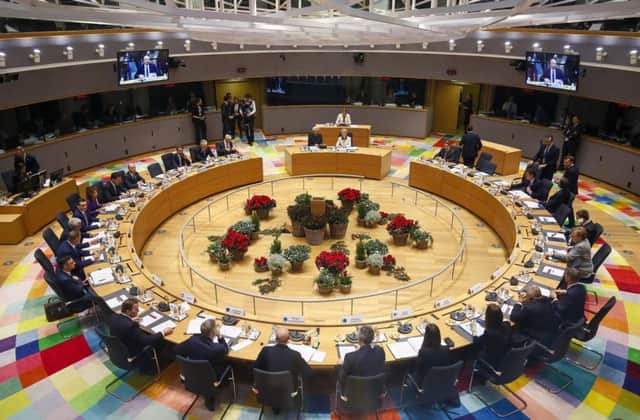Brexit deal before MPs by end of week as EU issues trade warning


With a Queen’s speech scheduled for Thursday, the Prime Minister’s Brexit deal could be put before new MPs at first reading as early as Friday, or Monday.
That will leave just 15 or 16 scheduled sitting days before the end of January deadline, although ministers have warned MPs could be called in to parliament on weekends if needed.
Advertisement
Hide AdAdvertisement
Hide AdTheresa May’s former legislative director, Nikki da Costa, has said it could take five weeks to get Withdrawal Agreement Bill through the Commons.
European leaders gathered for a summit in Brussels on Thursday and Friday were anxiously checking the results of the UK’s general election overnight, and welcomed the clarity offered by a large Tory majority.
Irish premier Leo Varadkar, who gambled on bilateral talks with Mr Johnson to break the deadlock over the Irish border backstop, said he was “relieved for my country” by the result.
French President Emmanuel Macron said there was a “very special relationship” on offer for the UK after Brexit through a trade deal with the EU.
“I want to tell our British friends and allies… you are not leaving Europe,” he said in a press conference.
But in a warning to Tories seeking a loose future relationship with the EU that allows the UK to strike its own deals with other countries, the French President made clear the offer was one of a high degree of access to the European market, in exchange for a high degree of alignment with EU regulations.
The UK faces an uphill struggle to hammer out a trade deal with Brussels by the end of the post-Brexit transition phase in December 2020.
“If Boris Johnson wants a very ambitious trade deal, there has to be very ambitious regulatory convergence,” the French President said, adding: “Be my guest.”
Advertisement
Hide AdAdvertisement
Hide AdMr Macron went on: “We do not want them to be an unfair competitor.
“My message to the UK is that the more loyal we are vis-a-vis each other, the closer relationship we can have. If the British prime minister and the British parliament want an ambitious trade deal, they know where the European standards are.”
And the Danish Prime Minister fired the opening salvo in what are set to be difficult talks over fisheries, arguing that access to British waters should be on the table in negotiations about access to European markets.
The fishing industry has warned that access to UK fisheries should not be used as a bargaining chip in wider trade talks.
“When it comes to Brexit, fishing is particularly important for Denmark, because it is a profession that depends on good cooperation with the countries that share the same fishing area,” Danish premier Mette Frederiksen said. “So there is no doubt that fishing really matters.”
The Taoiseach said the results boded well for those who supported the Withdrawal Agreement, and congratulated Mr Johnson for “an enormous victory for him on a personal level and a very clear result for his party”.
“It’s a positive thing that we have a decisive outcome in Britain in their elections. We had for a few years a parliament that wasn’t able to form a majority around anything,” Mr Varadkar said.
“I’m relieved, I’m relieved for my country and I’m also relieved for the UK. We’ve really had deadlock and gridlock for years now, now that’s going to pass.
Advertisement
Hide AdAdvertisement
Hide Ad“Now we have a majority in the House of Commons to ratify the Withdrawal Agreement, and next steps will be to ratify that agreement which guarantees no hard border between north and south, the protection of the Common Travel Area and British and Irish citizens’ rights will be protected.”
Mr Varadkar added that he “deeply regrets” the UK’s decision to leave the EU but said the people “have confirmed that now with this election”.
He said the next priority must be to get Northern Ireland’s institutions up and running.
“For us, it’s a case now of getting Northern Ireland working again, getting the Withdrawal Agreement ratified, which gives us the guarantees we’ve always needed on the hard border and citizens’ rights and the shared objective the Prime Minister and I have on negotiating a deep and economic future partnership, a trade deal-plus,” he said.